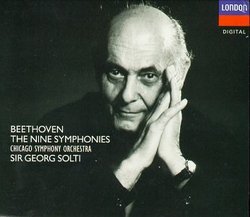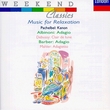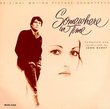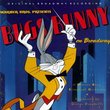| All Artists: Ludwig van Beethoven, Georg Solti, Chicago Symphony Orchestra, Jessye Norman, Robert Schunk, Reinhild Runkel, Hans Sotin Title: Beethoven: The Nine Symphonies Members Wishing: 1 Total Copies: 0 Label: Decca Release Date: 9/11/1990 Album Type: Box set Genre: Classical Styles: Opera & Classical Vocal, Historical Periods, Classical (c.1770-1830), Symphonies Number of Discs: 6 SwapaCD Credits: 6 UPC: 028943040020 |
Search - Ludwig van Beethoven, Georg Solti, Chicago Symphony Orchestra :: Beethoven: The Nine Symphonies
 | Ludwig van Beethoven, Georg Solti, Chicago Symphony Orchestra Beethoven: The Nine Symphonies Genre: Classical
|
Larger Image |
CD DetailsSimilar CDsSimilarly Requested CDs
|
CD ReviewsSolti's Great Beethoven- an essential! The Cultural Observer | 05/22/2006 (5 out of 5 stars) "Reviewers would tell you that Karajan's first Deutsche Grammophon recordings is the Beethoven cycle to own. While I believe that Karajan's string-rich virtuoso view of Beethoven's score is refreshing, a quick comparison of the score and Karajan's music shows that he often takes a very Wagnerian (rubato) view of the score. Most people believe that Wagnerian entails a brassy, loud "heavy-metal" handed interpretation of the music. This, however, is a misconception that needs to be erased. Unlike Wagner, Beethoven had metronome markings in his score that a conductor needs to interpret to music to make the music sound right. Also, the development in the symphonies' musical and emotional structure are aided by these score markings to make it easier for the conductor to bring forth the composer's message. Karajan took a Wagnerian style of conducting in the sense that he changed some of the tempi to his liking. Solti, however, follows Beethoven's score in a German Romantic tradition. This means that there is a transparency to his conducting, but not to the degree that Szell takes with his Beethoven. Every musical detail is heard, and the strings are very well accentuated too. Karajan's recording emphasized the strings too much and drowned the other instruments. I find that although his Beethoven symphonies can be rather ravishing, it does not offer a very complete vision of the music. These Chicago recordings (recorded by possibly the greatest symphony in the world at that time, the CSO) are undoubtedly the work of a conductor who knew the intentions of Beethoven very well and respected them. I highly recommend this set for anyone who wants to listen to Beethoven as it should be performed." Big shouldered beethoven from the city of big shoulders... Thomas Plotkin | West Hartford CT, United States | 08/05/2006 (5 out of 5 stars) "This is a broad, powerful, heavy-duty Beethoven symphony cycle, free of idiosyncracy, that can stand as a benchmark to measure against more unconventional interpretations, a kind of golden mean of Beethoven. Decca's spacious sonics foregrounds Solti's attention to orchestral detail; all the sections, particularly the low strings and the winds can be heard to beautiful effect. Solti's tempos are expansive, and as befits a great opera conductor,incident rules over architecture. The decade from the late '80's to the late '90's was a stellar period for Beethoven symphony cycles. The four best, each completely at odds with the other, are Gardiner (period performance practice, Beethoven as French revolutionary, martial, manic, zealous); Barenboim (Wagnerian, deep orchestral colors, expressive tempos); Harnoncourt (raw,fusing Barenboim's personal expressiveness and Gardiner's small forces and fast tempos --Beethoven as untamed avant gardist, somewhere between Bach and Schoenberg); and this set, where Solti utilizes a Wagnerian orchestra with strong on-the-beat phrasing (Toscanini to Barenboim's Furtwangler). This conductor was the last of the old-school Middle Europeans in the field, and one of the only members of his breed to benefit from a first-rate band recorded with clarity in digital sound. (Karajan's late Beethoven cycle is to be avoided at all cost). If you like your Ludwig Van straight up, technocratic, without weirdness or surprises, then this set is for you (I mean that as a compliment...)" Rock Solid Wayne A. | Belfast, Northern Ireland | 12/23/2004 (5 out of 5 stars) "Wow, this is one of the oddest assortment of reviews I've ever encountered--and the last comment is over five years old. I guess Sir George's set just doesn't matter any more.
Too bad. This is a very nice collection. What Solti and the orchestra do here is present athletic yet fairly staight-up renderings of the music. The athleticism may be due mostly to the recording quality, which is excellent, and the fact that a large modern symphony orchestra is being used (as opposed to chamber-sized or period instrument orchestra). His tempos are very well-judged and give additional weight to the music. A lot of thought went into this, so much so that one isn't immediately aware of it. Basically then, Solti is using a modern orchestra to let Beethoven's music speak for itself. The overall impression is one of quality all around--from Beethoven himself up. I rather think that despite his reputation as a bit of a loonie, Beethoven would not have gone for Furtwangler's often oddball approaches, Norrington's mania, or other hyper-ventilations. Brahms may have felt Beethoven breathing down his neck but remember Beethoven felt Mozart down his--and Beethoven may have been the best person of his age to properly judge and appreciate that particularly intimidating master (And remember, anyone worth their salt--to this day--felt the monumental presence of J.S. Bach!). Beethoven worked hard at his craft; I doubt he would have felt a need to, well, overstretch things or be too visceral. Maybe we play up that side of him a bit too much, drive his music a bit too hard when we should simply sit back once in a while and listen to what he wrote. I like the '63 Von Karajan set and a few others but of them all this one sits best for me. The playing is flawless. So here's to glamourless conductors like Boult and van Beinum, people who, with care and humility, reveal the genius of the music rather than ride it around the concert hall like a bucking bronco. And here's to Solti, a rare high-profile conductor who pulled himself back a bit so that Beethoven could take center stage for a change." |

 Track Listings (8) - Disc #1
Track Listings (8) - Disc #1










